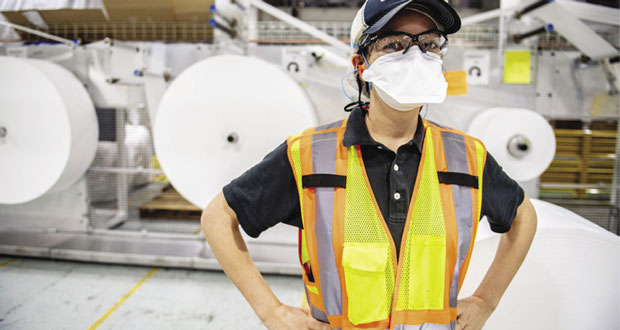 Olena Neznal, Vice President, Kimberly-Clark Professional EMEA, invites business to consider newly-urgent questions sparked by the pandemic. Namely, how do we waste less, use resources better, and keep employees safe?
Olena Neznal, Vice President, Kimberly-Clark Professional EMEA, invites business to consider newly-urgent questions sparked by the pandemic. Namely, how do we waste less, use resources better, and keep employees safe?
While COVID-19 has heightened awareness of health and hygiene, it’s also had an impact on sustainability agendas for businesses of all sizes. According to the Carbon Trust, over 70 per cent of companies think environmental management or sustainability priorities are likely to become more important as a result of the pandemic.
At Kimberly-Clark Professional, we’re on a mission to create workplaces that keep people healthy, safe, and sustainable. So, we’re inviting the FM sector to engage with us in the questions you can ask to help balance priorities for people and planet.
SOLVING SUSTAINABILITY CHALLENGES
I believe that no matter where an organisation is in its sustainability journey, it can benefit by phasing its ambitions. As a baseline, facilities managers should be looking to set challenging, yet achievable and measurable goals to improve their environmental sustainability performance. Supporting feedback and tracking mechanisms are equally important. They ensure there is accountability to progress.
Last year we released our “2030 Ambitions” – to improve the lives and wellbeing of one billion people in underserved communities around the world with the smallest environmental footprint. To be completely accountable, these goals are recognised by the Science-Based Targets initiative. As a result of announcing our 2030 Ambitions, Kimberly-Clark improved its ranking to 34th on Barron’s 2021 list of 100 Most Sustainable Companies.
We’re working hard to ensure these goals will enable us to support customers in achieving their own sustainability targets. We’re passionate about partnering with customers – across all sectors, including distributors and end users. In addition to technical expertise, we use our trusted and solutions to help customers address their specific sustainability challenges.
Here are four questions that can serve as an effective starting point:
#1 How can we waste less?
You won’t find the sustainable or ‘green’ section in our product catalogue or on our website because sustainability is a key consideration for everything we do and manufacture.
Our products are designed to optimise use and reduce product waste without compromising hygiene. As a founding member of the UK and US Plastics Pacts, we’re committed to solving the problem of plastic waste. By 2025, 100 per cent of our packaging will be reusable, recyclable, or compostable.
#2 How can we use resources better?
Effective and efficient management of resources not only brings environmental benefits but can also reduce costs, so it is an imperative for all FMs. It’s important to explore every opportunity to be more sustainable. We know that the supply chain must be continuously improved to create the smallest possible footprint from greenhouse gas emissions to waste and water. Taking a circular approach, 20 per cent of our global energy use is now from renewable sources. We share water with communities, recycling water, recovering resources, and ensuring it is returned cleaner than we found it. For example, at our mill in Koblenz, Germany, 900 tons of CO2 emissions are reduced annually through water recycling.
I’m especially proud to say that each year, we give new life to over half a million tons of recycled paper. As one of the world’s largest recyclers of paper, 70 per cent of the fibre in our products in 2019 came from recycled sources. We are on target to ensure that 30 per cent of the plastic in our Europe product packaging is recycled content by the end of 2021.
#3 How can we keep employees safe and well?
A survey conducted by Harris Interactive on behalf of Kimberly-Clark Professional – about how COVID-19 has affected perceptions of cleanliness and hygiene in the workplace – showed that three out of four people in the UK do not feel safe going back to the workplace, while 86 per cent said they would avoid a location if they didn’t think it was COVID secure. The pandemic has clearly increased the focus on workplace health, hygiene, and wellbeing, and it is important we work closely with customers to restore confidence and ensure that people feel safe.
#4 Empowering cleaning heroes
FM managers know better than most the crucial role their frontline people play every day. The pandemic created many challenges from economic pressures to ensuring employee and visitor safety, and we have worked closely with the sector to ensure it has had the best advice and access to the best products.
We’re proud to have launched scholarships for 10,000 cleaning professionals to become certified in infectious disease control measures, which is a critical step for pandemic response. The Kimberly-Clark Professional Scholarship Programme is offered in partnership with the ISSA and Global Bio-risk Advisory Council (GBAC). It focuses on prevention, response, and control measures, with an emphasis on the novel Coronavirus (SARS-CoV-2) and COVID-19. Delegates receive training, guidance, certification, crisis management, assistance, and leadership for all types of organisations.
Do you know a cleaning professional who would benefit from this? Funds are still available for all cleaning companies and in-house professionals. Sign up for programme here www.issa.com/kcp-scholarships.
It is so rewarding to work for a business where sustainability and ethical behaviour is part of our DNA.





